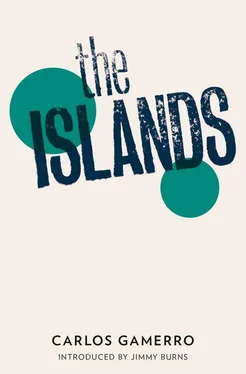‘It took them some time to catch up with me, late in the hunting season, when urgency had become routine to them. They asked hardly any questions: there wasn’t much they didn’t know by then. They left the hood on the first few times. It was horrible because I never knew what was going on, whether they were about to do something to me or not, my body couldn’t brace itself, I lived in a constant state of terror. I know I just blanked out at some point, like they’d pulled the plug: it just disconnected. Sometimes the intolerable thing is the awareness of what they’re doing to you, and when I lost that, I stopped caring about it; when the pain gets really bad, you faint and that’s the end of it. I lived in a total stupor for months: I suppose I must have been eating and sleeping and shitting, but I can’t remember anything, except those moments of pain from another world which, in the otherwise general void, eventually merged into one long howl of pain. They got bored with me in the end — some fresh meat must have arrived — and they threw me into a corner. One day they stuck my head in a bag, shoved me up and down the stairs and dumped me on the floor of a van with others like me. They took us, I found out later, to the Garage Olimpo two blocks from my apartment — which I never set foot in again; I think they kept it. They did things differently there: they were the ones wearing the hoods. I learned to recognise their bodies; there can’t have been more than four or five of them, and there was one who was clearly the boss: they called him “Captain”. The others came and went, but he was always there, like he was turning up for a date. From the taunts of the others I realised that he reserved this privilege for me alone. That brought me back. In the middle of nowhere, there was suddenly something I could hang onto — a ledge. And when he took his hood off one day, when I could once again put a face to him, give an identity to the sheer animal panic my whole world had become, I began to recover my own. You know who I’m talking about, don’t you?’
I suppose so, but the idea was so intolerable that I didn’t even dare to tell myself, and I sat there dumbly waiting for her to do so. After all, I wasn’t the one who’d started this little game.
‘My ex-husband. The girls’ father.’
I ought to have got up and split that very instant, but that’s what generally happens with the most harrowing stories: you’re disturbed yet so fascinated at the same time that you can only listen till the end, utterly in the grip of the teller, who makes the story last to prolong their control over us for as long as possible. Most of us Malvinas veterans are old hands at it: we know all the tricks.
‘Gradually my situation improved — between sessions of course. They treated me, clothed me, fed me. They did it routinely, anonymously, as if it were the same for everybody, but I knew that, if I’d outlived my shelf-life, it was because he wanted it that way. They were more careful during the sessions too: they put out their cigarettes and closed their knives, and they were careful to do the picana shocks where they wouldn’t leave such deep marks. And I was only scared when I couldn’t see him, although he hardly ever let me down. It would have been absurd to: they were our dates, the sessions were. In the few seconds when the total pain stopped, my eyes would search out his. And when they met, I felt as if his hand were holding mine and wouldn’t let go. Once — I’ll never forget that day — I noticed they were full of tears. I was strapped to the bed-springs, you see; they’d used the picana on me till I’d fainted, then thrown a bucket of water over me. And I was feeling sorry for him. Really, my brain must have been mashed potato by that stage, but at that moment I felt as if my suffering had a meaning, as if I’d be capable of putting up with all that and a thousand times more as long as he was there. It felt like a triumph. Think about it. Him, a man who’d done this a thousand times without batting an eyelid, he was crying now — and all because it was me, not just anyone, tied up there. How could I not feel flattered? There and then I made up my mind not to let him down. I’d put up with any pain, any atrocity to show him I was worthy of him. I smiled, to let him know and, though the smile could barely have been visible through my deformed features, I think he understood, because he wiped away his tears and gave the order to continue. I closed my eyes, bathed in tears too, but tears of gratitude. I was no longer alone. Someone had reached out a hand to me across the darkness; the terror had gone and in the soft, golden light bathing my soul the intermittent shocks of the picana flashed like distant lightning.
‘He made me abort my first pregnancy because I’d been raped by so many men that he couldn’t be sure the child was his. “If you’d talked earlier, we wouldn’t have come to this,” he yelled at me, as if I’d held out on purpose so as to have sex with lots of men. There was a grain of truth in it, of course: I preferred the rapes to the picana; I used to thank God when I saw one of them pulling his zip down, although his companions often used to give me more just to watch their pal jump from the shock. It was one of their favourite jokes: they never tired of it. His accusations hurt me because they were so unfair. I have proof that he himself sent them to rape me: by having me belong to everyone he thought he’d be able to loathe and forget me. The result, of course, was just the opposite: the more he gave me away, the sicker his desire became to possess me absolutely. He tried to free himself from my fatal spell and took me on one of those night flights … to let the sea take care of me. At the last moment, naked in his arms, drugged as I was by the cold coming in through the hatch or God knows what else, I embraced him tenderly (that’s what he told me) and at that moment, when he realised he couldn’t let me go, he thought about crossing the threshold with me. What a romantic, right? The sea would have been our wedding bed, he said; he didn’t know how much I hate fish. The only result of that flight (I can’t remember a damn thing, because they’d used horse syringes on us) was that I caught a dose of flu. I never saw my travelling companions again, of course. After that he moved me out of the cell and took me to his house, locking me away like a nun in a cloister. I’d have stayed anyway: I didn’t really want to see my family and told them as little as possible. That he was a soldier, yes. That he’d got me out of there too. They never understood any of it anyway; my mother, the silly cow, no doubt even thought “Well, well, who’d have imagined it? The girl gets herself thrown in gaol and comes out with a real catch?” Did I mention that they’d caught me at my parents’? The men holding their shotguns and my old man puffing out his chest. “If my daughter’s done something she shouldn’t have, I won’t be the one to stand in your way. Do your duty, officer.” What could I do in my situation? Call a friend? I did try though, more than once, but I’d hang up when they answered. Once I rang a friend of mine they’d taken in earlier, to see if she was still alive, and without hesitation she asked the silent receiver “Gloria? Is that you? Won’t they let you talk?” I stopped calling my friends after that: it only made me suffer. He made me unworthy of them and without them I had no other option but to get closer to him. And when I fell pregnant again, that was it. The friends I have now are all new. I don’t have to tell them anything, and if I do, they have nothing to compare me with: the only Gloria they know is this one. Funny, isn’t it? Most people who’ve been through what I have are afraid of bumping into their torturer in the street. Not me. I was nearly nine months when he didn’t come home one night, nor the following night either. It wasn’t the first time, but he always used to give me some sign: leaving the house full of food or something (I still wasn’t allowed to go out alone). Before the week was out, I heard the news about the recovery of the Islands on the radio and realised where he’d gone. Along with the revelation came the labour pains. I could feel them inside me, as if they were trying to peck their way out, and eventually a neighbour showed up with the police, woken by my screams. It was sheer agony, the worst of all. The last pain he caused me. My two beautiful little girls were born in the ambulance on the way to the Santojanni, and I was born with them that night. They had to give me a cæsarean without anæsthetic on some street corner or other. I was covered in blood. Later they congratulated me on how well I’d withstood the pain. Ha! Mamma mia! They weighed one kilo eight hundred and one kilo nine hundred, because they were slightly premature. It was the night of 2nd April 1982.’
Читать дальше











